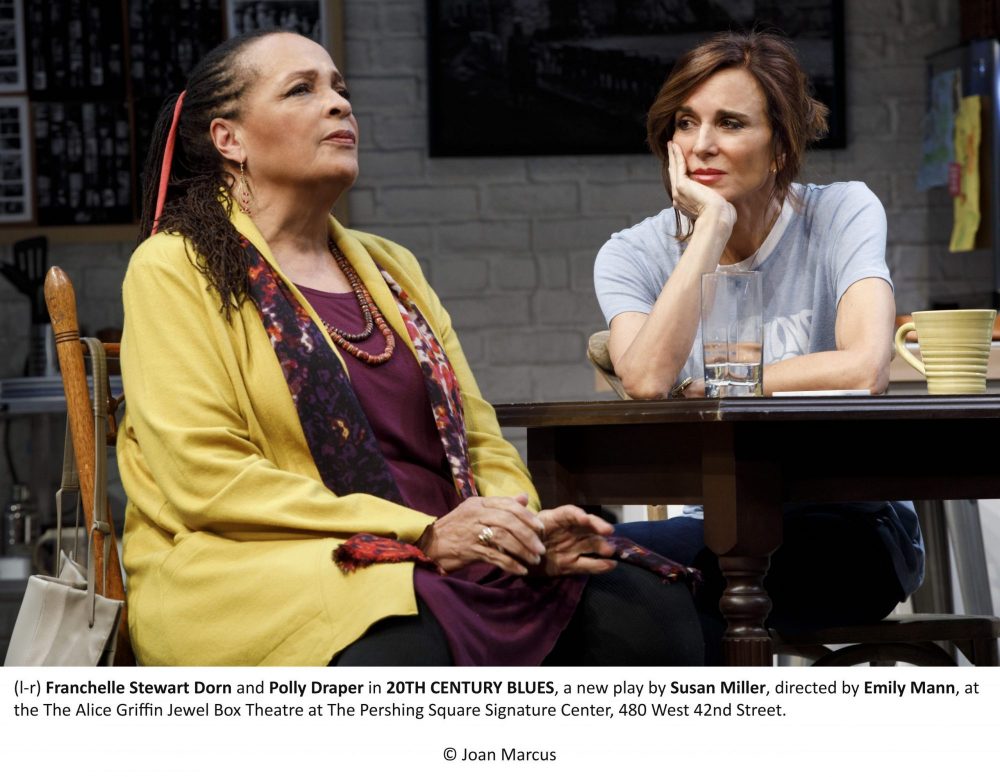A brilliant new play ’20th Century Blues’ at the Signature Theatre stages four older women’s complex lives.
It’s rare to see women—especially a group of women in their 60s—portrayed as the subjects of a major new play in the New York theater. Which is why award-winning playwright Susan Miller’s 20th Century Blues is such a treat. Miller was a writer for The L Word and also for the hit web series Anyone But Me.
She has numerous credits in TV and film and has also written and performed her landmark solo show, My Left Breast to great acclaim. In 20th Century Blues, Miller introduces us to women who might as well be ourselves or women we know.
That is to say, real women who have experienced a lifetime of joy and disappointment, hope and heartache, and value their connection to each other above all else.
Allow me to introduce them to you: Danny is a witty, attractive, and acclaimed photographer enjoying a late-in-life success. Her mother, Bess, is 91 and in the early stages of dementia.
Sil, a realtor, is divorced, works her butt off to stay solvent, and worries about aging. Mac, African American and gay, is an investigative reporter driven to retirement by digital media. And Gabby rescues animals and frets about her aging husband.
The story begins with the charismatic Danny, giving a TED talk about her photography and how she became an image-maker. She’s always been drawn to photographing groups of people and one, in particular, has held her interest for 40 years: her friends Mac, Gabby and Sil, former cellmates from when they were arrested at a protest in the 1970s.
The primary action is set in Danny’s lovely New York loft where the women meet for brunch on the one day of the year they come together to have their photo taken. As they catch up, revive cherished memories, and share their hopes and fears, the women’s shared history emerges gradually, like a photo developing in a darkroom.
These women are complex characters who know each other well, except for a few secrets, but still have some unfinished business—with each other, and with a cold new digital world. There are also questions that need to be answered. What is the meaning of their friendship? How will the future unfold? And who, in fact, owns the photos they have been taking together for 40 years?
Miller’s artful dialogue, embedded with witticisms and sharp observations, flows naturally and as directed by multi-award-winning playwright and director Emily Mann, the action circuitously but beautifully delivers different levels of intimacy and conflict between women who love each other in a unique way. There is never a dull moment. A stolen lesbian kiss. An unacknowledged affair. A struggle over authorship. It’s fun and compelling viewing.
Miller’s script is clever and wise, bursting with great lines and naked truths. There’s even a subtle dig at the 2016 election outcome that I won’t spoil. But as the women reflect on lost political causes, lost loves, the scarcity of money, and doubts about the future, it becomes apparent that none of that really matters. What does matter is their friendship and the fact that they fully see each other—every part of each other.
At the beginning of the play the women agree not to talk politics, and yet as the play unfolds we see that—true to the old feminist adage—the personal is indeed political. As a black lesbian, Mac (wonderfully portrayed by Franchelle Stewart Dorn), is used to tackling big issues but now finds herself in a shrinking media landscape.
Can she tailor her talents to fit this strange new world and maintain relevance? And Miller gives Mac some of the best lines in the play. Of her lesbian kiss with Danny back in 1982 Mac quips,
“She’s straight. It was just a lapse in orientation.”
Mac is the play’s conscience and she worries that Danny’s archive of their shared history is just another exercise in white privilege: “I’m not a young girl who’s been raped on her way to fill the family water bucket. I’m not a refugee. But maybe in one of those pictures I look like I’m about to lose everything.
When, really, what’s in my face is just everyday pain…I don’t want anyone to look at me and think I’ve appropriated real suffering.” And she has reason to feel responsible, rightly observing, “When you’re African American and a woman and gay, it can be a little tricky as to which cause you’re most afraid of not living up to at any given time.”
If Mac is the play’s conscience, Danny (a magnetic Polly Draper) symbolizes ambition; Gabby (an endearing Kathryn Grody) is empathy; and Sil (a feisty Ellen Parker) is doubt—with a dose of self-preservation. Sil throws a wrench in the works when she reveals that she’s seriously considering plastic surgery, thus threatening the values of the group—not to mention the veracity of their photo project. Mac warns Sil, “Plastic surgery isn’t going to change the fact that every generation gets a turn. It’s just not ours anymore.”
While Danny attempts to persuade the trio to take one final photo so that she can include the complete body of work in her retrospective, the women wonder if she is honoring their time together, capturing truth, or manipulating them for her own gain. Will they take that final photo? And if they do, what will it mean in the scheme of things?
One of the great pleasures of going to the theater is to collectively experience life in real time; to look into a mirror as it is held up to society. 20th Century Blues offers reflections of female existence that are usually denied us. So grab your mom, your sister, your girlfriends, and go see yourselves. See your lives as they have been, as they are, and as they may be.
